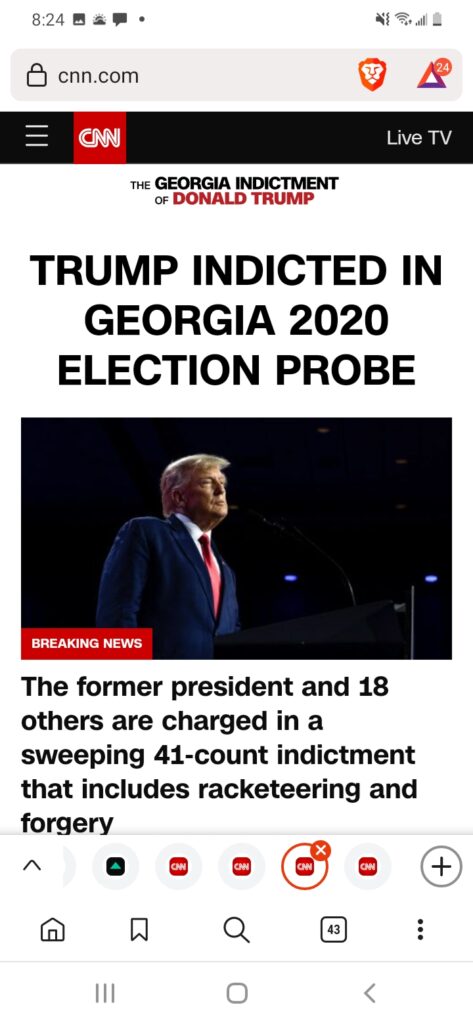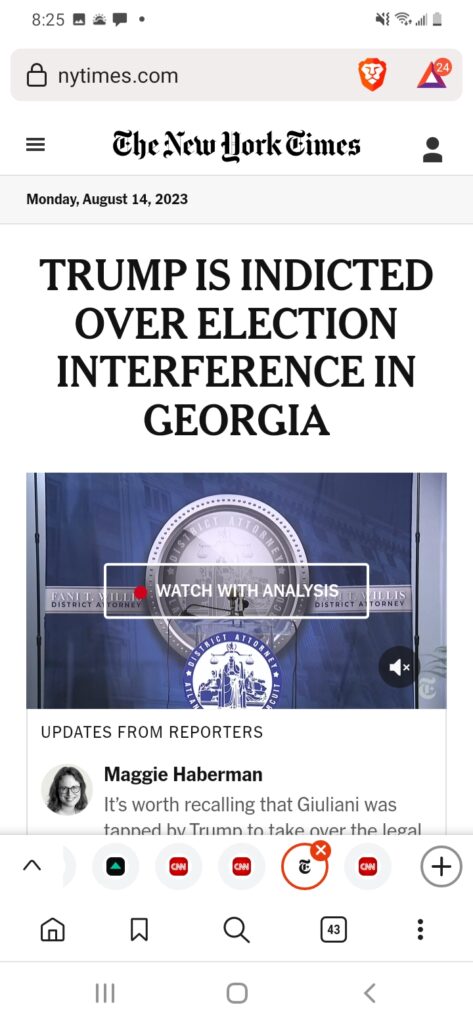Yesterday, I was able to use MyStatusTool, my minimal blogging tool, to capture URLs from a set of open tabs on my phone. I structured the posts with the website link, then the title of the post. I was able to post to my instance, all from my phone. The hardest part was selecting the text for the link. I use the Brave web browser, and another menu would pop up before the editor toolbar, so I had to tap several times to get to the link button. I think I will keep trying this as a way to capture links for later use/classification.
August 2023
Followup on consumerism and activism
Ken Smith posted recently, continuing to riff on musical performances (here, being on Ed Sullivan) and also remembering his posts on Pete Seeger, and relating them to acts of activism. In the recent post, he notes how people go to concerts and are more disposed to spend money on things related to the concert/group they heard. As consumers, they already know how to spend money on things that they want. For a performance by a musical activist, there should be information/flyers/greeters at the end to communicate about “how to affiliate with others and help move the issue forward in our civic life” (my idea) (quote from Ken’s recent post).
For any issue, there are people for it and against it. Attending a concert where an activist performs could be considered an act of activism, but (as Ken Smith says) if there is no follow-through, the momentum/energy of the event fades away. So – what to do about it? Here, I think some distinction should be drawn between the person who is already an activist and a person who thinks they want to be an activist, but are not sure what to do. If a person is an activist, and is not having much success in promoting an issue or cause, perhaps one of the ideas from my Activism in Atlanta post is appropriate (find the organization that is already working on that problem). Hillary Rettig, in her book “The Lifelong Activist“, has an entire section on how to be more successful in pursuing activism ( the full text of the book is available as a free PDF). In a November 2022 post, Ken Smith lists 6 areas of what he calls the “activism toolkit” that could also apply here.
The Atlantic: The Constitution Prohibits Trump From Ever Being President Again – J. Michael Luttig and Laurence Tribe give an overview of how Section Three of the Fourteenth Amendment forbids holding office by former office holders who then participate in insurrection or rebellion (see also this recent paper on this subject). Sounds good to me!
Activism in Atlanta
I did a search for “activism 101” yesterday, and found an episode of the podcast While Black, recorded in 2019, interviewing an activist called City. City does activism in Atlanta, Georgia, with a current focus on police brutality. I listened to it today, and jotted down some notes when the interviewer asked for three things that someone who wants to get involved in activism should do (35-40 minutes into the podcast):
- Find what problem that you are going to be passionate about.
- Half of the people only find problems that everyone is talking about, but are not passionate about it
- Find your organization that is already working on that problem.
- You don’t have to join them, but you can work along side them
- Put yourself in a position where economically your problem can be fixed
- Make sure that your livelihood is not affected
- Have something or someone that can take care of you/family
- Everyone is needed – even social media activists
- You need goals
- If you don’t have that, you will be running around with your head cut off
Tools and activism
Ken Smith posted some quotes from Pete Seeger recently, where Seeger states that working within one’s home community is the most important work we have to do right now (Ken’s post title is “Essential Local Politics”). I feel that there is a great amount of information available online to help/assist/train individuals how to do work/activism within their communities. I have a list of resources available here, but I think the Community Tool Box from the University of Kansas is an excellent place to find frameworks for identifying an issue or issues to get involved with, and to identify concrete next steps.
In an earlier post, Ken Smith appears to express the opinion that he would like to see tools that help people get together to do work, to create content, to organize activities, and to have identity to allow them to affiliate with others and have a stronger voice. In a similar way to my first paragraph, I think there are many available online tools to help people with this work. Stephen Downes has created a massive resource called “Creating an Online Community, Class or Conference – Quick Tech Guide”. I think the tools identified here could satisfy a lot of what Ken is looking for supporting activism. I welcome Ken’s input on this.
Queens man indicted for the fourth time
No updates from the Queens Eagle (only covered the first time), so here we go!


CNN: Trump indicted in Georgia 2020 election subversion probe
MSNBC: Read the indictment
Atlanta Journal-Constitution: Copying of election data brings conspiracy charges
Atlanta Journal-Constitution: Trump, 18 others indicted for trying to overthrow 2020 Georgia election
JustSecurity.org: What to Expect When You’re Expecting a Trump Trial in Fulton County, GA
CNN: Read the annotated indictment
Atlanta Journal-Constitution: Complete coverage on Georgia grand jury and indictment
The Bulwark Newsletter: What’s new in the latest Trump indictment
More on curation workflows
Ken Smith has written a reply to my post on engaging and curation. In the post, he discusses “standing searches” for a topic or phrase, and how (to me) that curating RSS feeds can be a search at a particular level. He also addresses the topic of activism, and how the concept of search might apply there, but that activism needs something more. I would like to explore this more.
The most common type of “standing search” I am aware of is Google Alerts (see link to this at Google). I am sure there are other services providing this type of functionality. As for curating RSS feeds, this can be done for private consumption using any feed reader (Feedly, River5, The Old Reader, FeedLand, and so on). I like using River5 because it supports display of aggregated feeds (or rivers) easily in a single page application (such as bloggers using the Old School blogging tool in Drummer, bloggers using the 1999.io blogging tool, and writers from Politico following the Ukraine war).
So, curation can be performed by collecting feeds that generally post on a topic. However, these feeds may benefit from further curation, in that if a user is interested in a subset of stories/posts contained within those feeds, it could be distilled into an even more focused list of stories/posts. The Radio Userland tool supported creating feeds of this kind in an easy manner, displaying items from subscribed feeds and checkboxes next to the items if you wanted to copy those into an editing window and then post them in a particular category on your weblog. I think there is a need for this kind of tool – I am going to try to prototype this in the near future.
Another level of curation could be to provide additional text/narration/analysis of the stories/posts – to add more value than just a link and the initial paragraph from the post – to tell the reader why they should take a look at this post. Blogger Jason Kottke been practicing this type of blogging for a long time. Currently, several people whose work I follow add this analysis within the context of a newsletter (Stephen Downes’ OLDaily, Heather Cox Richardson’s Letters from An American, and Joyce Vance’s Civil Discourse are excellent examples).
All of the above examples can feed into groups of people interested in activism related to a particular topic. Jennifer Hofmann runs the Americans of Conscience Checklist. Started as a single person effort, this site has grown into a group of people who review items to include in the checklist, and organize the work of distribution. The checklist itself is a set of concrete actions to protest or support different issues. From past posts to the website, it is apparent that multiple people are monitoring activities of multiple websites/organizations, and the group draws on this information to select issues to push out to subscribers. Ken Smith himself has created lists of things to do in Indianapolis, which is another example of organizing information for use.
To sum up, I think that there are tools that can be used and workflows that can be defined to support curation and engagement. I have tried to collect some resources/food for thought in this post. I welcome Ken’s further thoughts on this topic.
Engaging and curation
Ken Smith recently wrote about engaging others on a topic and on curation – I have a few comments.
From the engaging others post:
The famous speaker works up the crowd about this or that issue, and then at the end the audience files out and recedes and fragments into their many private lives. It is a parallel case for blogging and other social media, isn’t it? We nod at the end of a message that moves us, but the publishing platform is not set up to encourage and simplify further steps: affiliation with others, for one thing, the power move that gives political beliefs a kind of social body moving, speaking, and echoing widely in the world.
From the curation post:
Used to be if you followed the daily writing of 15 interesting bloggers, each one would be following 10 different bloggers and journalists you weren’t following, and so your 15 would keep you informed about the best writing each week by 10 x 15=150 people they respected.
These are important ideas. The first suggested that there should be ways for readers to engage and stay engaged with a subject or topic. The second suggests that there are workflows that could be created to follow posts on a topic and create linkblogs or other collections that could curate the best info out there. For both of these, it sounds like users and developers should start to “party” and work together as mentioned in a number of Dave Winer posts (Dear Doc and Dave, What I Wanted from Blogging, What I Wanted from Blogging Part 2, Scripting News from January 22, 2020). If anyone is interested in working together on these ideas, let me know!
I-Programmer.com: Fundamental C: Getting Closer To The Machine (book review)
Eater.com: 20 Mind-Blowing Burgers in Portland and Beyond